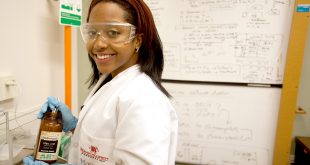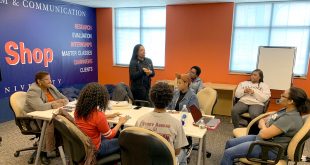In a 30-year career researching highly specialized areas of neuroscience, Morgan State University biology professor Gloria Hoffman, Ph.D. has gained international acclaim as an expert and has broken new ground for the institution. Her recent efforts have positioned Morgan, the Johns Hopkins Medical Institution (JHMI) and the National Institutes of Health (NIH) to successfully finish year one of a five-year, $3.1 million grant to study how the brain regulates reproduction.
The Eunice Kennedy Krieger National Institute of Child Health and Development in August 2010 awarded the grant to fund the Cooperative Research Partnership to Promote Workforce Diversity in the Reproduction Sciences (CPDR) program. Undergraduate scholars from Morgan State University and JHMI are trained by scientists at both institutions and learn to use basic techniques in neuroanatomy, physiology, and molecular biology that fill gaps in the field.
Dr. Hoffman played a leading role in securing a share of the grant for Morgan. Morgan biology professor Michael Koban, Ph.D. brought an impressive record of integrative research and undergraduate involvement to the research team. Morgan’s selection was based on both the quality of the research and the ability to reach minority populations within the underrepresented field.
“The purpose of this program is that the NIH, while supporting a number of programs to bolster minority success, has no other program focusing on the reproductive sciences,” Dr. Hoffman explained. “Thus the goal is completely unique. Need for such a program stems from the poor representation of underrepresented minorities in this field.”
“As a major partner, MSU benefits by exposure to a larger research environment, and JHMI gains from the facets of research we provide. Since we can enlist a greater number of students who fulfill the criteria that the program has set, Morgan is poised to make a greater impact on the numbers of students who will eventually contribute to research in this area.”
The program targets freshman at both institutions in their second semester of classes. Morgan freshman Brielle Hendricks, from Temple Hills, Maryland, is one of nine student trainees in the program. At age 16, she watched a TV documentary on neurology and became fascinated with how the brain works. She also like learning about the different regions of the brain and what body functions and hormones they control.
“I was very excited when Dr. Hoffman informed me of the program, but I was really nervous when she told me I would have to interview with both Morgan and Johns Hopkins scientists. I have been in the program for six months and really like it. I really like going to the “rat room” because I like handling animals and performing procedures…Working with rats has given me a whole different perspective about them,” she says.
Morgan’s research will focus on “connectome.” In the brain, there are two populations of kisspeptin neurons. One is specific to females and regulates the reproductive cycle. The other function is not fully understood but is believed to govern the daily release of gonadotropic hormones from the pituitary in both males and females, and govern the timing of puberty.
Participating students are expected to learn laboratory research methodology /technical training, develop their technical skills, complete three-years of training from start-to-finish, attend lectures and lab work, co-author at least one peer-reviewed paper published in a high-ranking journal, and apply and be accepted into a Ph.D. program preferably within reproductive science.
For more information or interviews, contact Dr. Gloria Hoffman gloria.hoffman@morgan.edu or Dr. Michael Summa msumma1@jhmi.edu
 Morgan State University Newsroom Morgan State University
Morgan State University Newsroom Morgan State University




